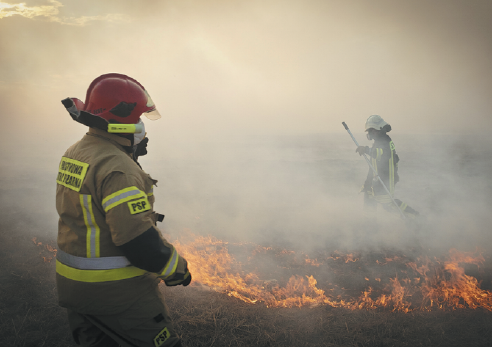Race to contain Polish park blaze

Around one-tenth of the biggest national reserve in Poland is on fire after what are thought to have been illegal grass fires lit by farmers got out of control.
The Biebrza National Park in the northeast of the country, near the border with Belarus, is a low-lying wetland area, known for its rich birdlife, beavers and elks.
"Fires in the Biebrza National Park break out every year, but such a large one has not been seen for years. The situation is very serious," said Poland's Environment Minister Michal Wos.
The ministry said it is thought that the illegal clearing of dead grass was the main cause, and it was made worse by the country being in the grip of its worst drought in years.
"It is not possible now for fire to ignite itself-this is not the middle of summer, there is no heat or storms," said Andrzej Grygoruk, park director.
"I don't know what to call it. Stupidity? Irresponsibility?"
Tour guide Janina Agnieszka Zach told the TVN channel the blaze may take months to bring under control."Spring is an abrupt explosion of life. It is impossible to calculate the loss. This is a tragedy, it cannot be described."
The Polish Institute of Meteorology and Water Management, or IMGW, has warned that a dry winter and the current lack of rain mean that this year the country could be on course for its worst drought in a century, with significant consequences for the agricultural industry.
"The current situation leads to dry soil, which during the planting period may ultimately affect crop yields," IMGW spokesperson Grzegorz Walijewski told local newspaper Gazeta Wroclawska.
In 2019 the Polish government announced a $3.3 billion anti-drought initiative, focusing on water retention, but environmental groups in the country have said wasteful water policies are a contributory factor to the fire.
"We regulate rivers, straighten their banks, conduct harmful maintenance works, which accelerate the outflow of water, we build dams and hydrotechnical barriers, dry marshes," said a recent report by the World Wildlife Fund Polska.
"We forget that it is natural rivers and their valleys that counteract drought, and wetlands are the best areas for natural retention."
The fire broke out in the same week that the 50th annual Earth Day was celebrated around the globe, and data released by the European Union's Copernicus Climate Change Service revealed that 11 of the 12 hottest years on record for the continent have occurred since 2000, with 2019 being Europe's hottest year ever.
Last summer was marked by extreme heat across Europe, with the United Kingdom recording its highest temperature, 38.7 C, in Cambridge in July.

Today's Top News
- Provinces focus on growth quality
- China recalibrates solar industry for long-term competitive strength
- Tangible steps urged to boost Sino-US ties
- Port ruling exposes US' unbridled greed: China Daily editorial
- Bloc-based rules undermine global trade order
- China records sharp rise in number of generative AI users






























